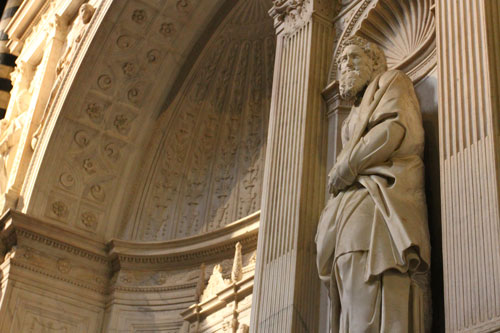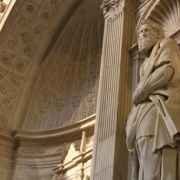Remember People
/0 Comments/in Weekly Devotional/by David GuzikWhen I send Artemas to you, or Tychicus, be diligent to come to me at Nicopolis, for I have decided to spend the winter there. Send Zenas the lawyer and Apollos on their journey with haste, that they may lack nothing. (Titus 3:12-13)
Many times, towards the end of one of Paul’s letters, he included personal notes to several different people. Paul’s letter to Titus was no different. Here, towards the very end of this short letter, Paul mentioned four people: Artemas, Tychicus, Zenas, and Apollos.

It’s easy to read these words and respond with a great big, “So what?” After all, who really cares about these four people that we know so little about? Yet there is value even in passages like these.
First, this shows us that Paul was a real man in a real world with real friends that he had regular contact with and care for. We can think of a man like Paul of something like a superman, but he wasn’t. He had friends and needed friends and valued these co-workers in the kingdom.
Second, it shows that the work God did in the first century of Christianity went far beyond what the Apostle Paul did. We know the most about Paul’s work, but there may have been many people who did a similar work that Paul did that are lost to history. The mention of these several names shows the dynamic growth of the Christian movement.
Time to Move On
Third, it shows that Titus was not to do his work on Crete forever. It seems that when Artemas and Tychicus came to Titus, he was to leave Crete and join Paul at Nicopolis (a city on what is today the western coast of Greece). Titus was to do as much as he could until those two came, and then turn the work over to them. There was time and a season for Titus’ work there, and it would end.
Fourth, it shows that we should support those who do God’s work. When Paul said, send Zenas the lawyer and Apollos on their journey with haste, that they may lack nothing he meant that Titus should give them the money and help they needed for their travel. Zenas and Apollos probably the ones who brought the letter to Titus. When they left, Titus was to use the money in common among God’s people to send them on their way.
If there are some people you can support along the way as they do God’s work, the prayerfully consider doing. Maybe there is a Zenas or an Apollos you could provide for.
Denke daran, abzuweisen
/0 Comments/in Wöchentliche Andacht/by David GuzikEinen sektiererischen Menschen weise nach ein- und zweimaliger Zurechtweisung ab, da du weißt, dass ein solcher verkehrt ist und sündigt und sich selbst verurteilt hat. (Titus 3,10-11)
In diesem Abschnitt von Titus 3 sagte Paulus, dass Titus an verschiedene Dinge denken sollte. Hier erinnerte er ihn daran, dass er einen sektiererischen Menschen abweisen sollte.

Sektiererische Menschen sind kein neues Problem in den Gemeinden. Titus 3, 10-11 zeigt uns, dass sie schon in den frühesten Tagen der Christenheit eine Herausforderung für die Pastoren und Gemeindeleiter waren. Ein sektiererischer Mensch ist jemand, der Gottes Kinder ohne guten Grund voneinander entzweit. Ich habe noch nie eine sektiererische Person getroffen, die nicht glaubte, sie hätte einen guten Grund, aber sicher haben das nicht alle.
Wenn man Titus 3, 10-11 mit dem vorangegangen Vers betrachtet, sehen wir, dass diese sektiererischen Menschen sich auf „törichte Streitfragen“ und Dinge, die „unnütz“ und „nichtig“ sind konzentrieren. Es scheint, dass sie sich wegen Dingen, die unwichtig sind, spalten.
Vor kurzem hörte ich einen respektierten Pastor sagen, dass eines der größten Probleme in der Gemeinde heutzutage die Belanglosigkeit ist. Die Leute fühlen sich angegriffen und entzweien sich wegen kleinen, sogar unbedeutenden Dingen. Sie verlieren ihren Sinn für Verhältnismäßigkeit und gehen ihren eigenen Weg und ziehen andere mit sich. Ich glaube, es liegt viel Wahrheit in der Beobachtung dieses Pastors.
Was macht man mit diesen Menschen
Paulus sagt es uns: Als erstes sollte man mit ihm oder ihr sprechen, und zwar ein- und zweimalig. Unsere erste Reaktion auf solche Menschen sollte nicht Zorn oder Frust sein, oder ihnen zu sagen, sie sollen „die Klappe halten“. Wir sollten ihnen mit Liebe begegnen und sie in Weisheit auf gottgefällige Weise zurechtweisen. Und man sollte bereit sein, dies mehr als einmal zu tun.
Wenn sie ihr sektiererisches Verhalten fortführen, kommt noch Rebellion, das Ablehnen von Autorität und dass sie nicht bereit sind zu lernen zu ihrer Sünde hinzu. Nur dann sollten wir sie abweisen. Das bedeutet, dass wir sie aus der Fürsorge und der Geborgenheit der Gemeinschaft ausschließen. Wir sollten dies so sanft wie möglich tun und nur mit dem nötigen Maß an Bestimmtheit und nicht mehr.
Wir dürfen ihnen keinen Schaden an Körper, Seele, Charakter oder ihrem Eigentum zufügen. Die Zeiten, in denen die Kirche mit sektiererischen Menschen so umging, dass sie verfolgt wurden, waren dunkle Zeiten und sollen sich niemals wiederholen.
Es ist gut zu wissen, wie man mit solchen Menschen umgehen soll. Aber bedenke: bist du einer, der entzweit? Streitest du, diskutierst du und spaltest wegen Dingen, die nur ein kleines Stückchen im großen Ganzen sind? Es ist hart, diese Sünde in uns selbst zu sehen; bete, dass Gott sein Herz durchforscht und dass du darauf hörst, was Er dir sagt.
Sunday Recovery
/0 Comments/in For Pastors, Preachers, Bible Teachers/by David GuzikAnd Jesus,
immediately knowing in Himself that power had gone out of Him,
turned around in the crowd and said, “Who touched My clothes?”
(Mark 5:30)
Recently a pastor friend asked me what I did to recover from the Sunday-afternoon blues, the kind of thing that comes from the physical, emotional, and spiritual energy spent on a Sunday or weekend of services.

When Power Has Gone Out of You
It’s natural to feel spent after a weekend of serving God, His people, and a needy world. When the woman touched the hem of Jesus’ garment and received something special from Him, Jesus felt something go out from Him (Mark 5:30). When we do ministry right, there is real energy spent – especially spiritually.
I answered my friend with some random thoughts:
(1) If possible, naps are great, or an hour zoned out in front a football game or something else. I find myself socially and spiritually spent after a Sunday, and fatigue can be a big cause of those Sunday afternoon blues.
(2) If I didn’t preach well, I just try to be thankful that I have an opportunity next time and determine to trust God to be better prayed-up and better prepared.
(3) I accept the truth that I won’t preach an amazing sermon every Sunday. I don’t need to. If I do a solid but not spectacular job week after week, the occasional bad sermon isn’t such a big deal.
(4) If there is some kind of conflict at the church draining me, I ask my wife for her advice and pray with her about it. If you aren’t married, find a trusted friend with whom to vent a little and to pray a lot.
(5) If I feel those blues, I don’t worry about having them. I realize that they will come and go, and I don’t need to feel that something is severely wrong when I get them. I will feel better tomorrow or even sooner.
If you’re feeling kind of blue after a weekend of serving God, don’t worry too much about it. Get some rest and let God restore your soul. We’ll all get through it together!
Blessings to You in Jesus’ Name – David Guzik
Click Here to Receive Email from David for Pastors, Preachers, and Bible Teachers
Remember to Reject
/0 Comments/in Weekly Devotional/by David GuzikReject a divisive man after the first and second admonition, knowing that such a person is warped and sinning, being self-condemned. (Titus 3:10-11)
In this section of Titus 3, Paul told Titus to remember several things. Here he told him to remember to reject a divisive man.

Divisive people are not a new problem for the church. Titus 3:10-11 tells us that they have been a challenge for pastors and church leaders from the earliest days of Christianity. Simply said, the divisive man divides people in God’s family without good cause. I have never met a divisive person who didn’t think they had good cause, but clearly not all of them do.
Connecting Titus 3:10-11 with the previous verse, we can see that these divisive people were focused on “foolish disputes” and things that were “unprofitable and useless.” It seems they divided over things that didn’t matter much.
Recently I heard a respected pastor say that one of the biggest problems in the church today is pettiness. People get offended and divide over small, sometimes trivial things. They lose their sense of proportion and end up going their own way and drawing others with them over minor issues. I think there was a lot of truth in that pastor’s observation.
What to Do With the Divisive
Notice what Paul said to do with the divisive person. First, reason with him or her, and do it a first and second time. Our first reaction to such people should not be anger or frustration, or to tell them to “shut up.” We should approach them with love, bringing godly admonition in wisdom. We should be willing to do this more than once.
If they persist in their divisive ways, they add rebellion, rejection of authority, and unwillingness to learn to their sin of divisiveness. It’s only then that we should reject them. This means that we should put them outside the care and comfort of the community of God’s people. We should do this as gently as possible and with only the necessary measure of firmness, not more.
Notice that we are not to do them any harm in body, soul, character, or property. The times when the church dealt with divisive people by persecuting them in those ways were dark days that, God helping, will never be repeated.
It’s good to know how to deal with such divisive people. But consider this: are you the divisive one?Do you argue and dispute and divide over things that are small in the big picture? It’s hard to see this sin in our self; pray that God searches our heart and mind and that we listen to what He tells us.
Denke an die Dinge, die wichtig sind
/0 Comments/in Wöchentliche Andacht/by David GuzikDie törichten Streitfragen aber und Geschlechtsregister, sowie Zwistigkeiten und Auseinandersetzungen über das Gesetz meide; denn sie sind unnütz und nichtig. (Titus 3,9)
In diesem Abschnitt von Paulus` Brief an Titus erinnerte er seinen jungen Mitarbeiter an verschiedene Dinge. Mit diesen Worten erinnerte er Titus daran, sich auf die Dinge zu konzentrieren, die wichtig sind, damit er sich nicht von törichten Streitfragen und Dingen, die unnütz und nichtig sind ablenken ließ.

Das war Paulus wirklich wichtig. Einige Male warnte er Timotheus und Titus vor der Gefahr, sich mit törichten Streitfragen und Auseinandersetzungen zu beschäftigen:
So ist er aufgeblasen und versteht doch nichts, sondern krankt an Streitfragen und Wortgefechten, woraus Neid, Zwietracht, Lästerung, böse Verdächtigungen entstehen. (1. Timotheus 6,4)
Bringe dies in Erinnerung und bezeuge ernstlich vor dem Herrn, dass man nicht um Worte streiten soll, was zu nichts nütze ist, als zur Verwirrung der Zuhörer. (2. Timotheus 2,14)
Die törichten und unverständigen Streitfragen aber weise zurück, da du weißt, dass sie nur Streit erzeugen. (2. Timotheus 2,23)
Verheddere dich nicht
Heute ist es durch die sozialen Netzwerke schnell passiert, dass sich Gottes Kinder in törichte Streitfragen und Auseinandersetzungen verstricken, die unnütz und nichtig sind. Wir müssen beten – viel beten – und um Weisheit bitten, dass wir diesen Auseinandersetzungen fern bleiben, die zu nichts führen.
Die Gemeinde muss für die Wahrheit stehen, doch sie darf nicht zu einer weiteren debattierenden Gesellschaft werden. Es gibt wichtigere Dinge, über die man reden muss als viele dieser Sachen, über die gestritten werden. Wir können uns so in etwas herein steigern, dass wir irgendwann nur noch den Streit gewinnen wollen.
Ich habe einmal gelesen, dass das Wort, das Paulus hier für meide benutzt wörtlich bedeutet, sich umzudrehen und in die andere Richtung zu gehen. Wir sollten solchen nutzlosen Streitigkeiten den Rücken kehren und uns auf Gottes Wort konzentrieren.
Bitte Gott um Weisheit für dein eigenes Leben. Bist du auf gute Werke bedacht? Bist du im Hier und Jetzt für etwas gut, oder bist du für nichts gut?
Remember Things that Matter
/1 Comment/in Weekly Devotional/by David GuzikBut avoid foolish disputes, genealogies, contentions, and strivings about the law; for they are unprofitable and useless. (Titus 3:9)
In this portion of Paul’s letter to Titus, he reminded his younger co-worker of several different things. With these words, he reminded Titus to focus on the things that matter, to not get distracted with foolish disputes and things that are unprofitable and useless.

This is actually something that was important to Paul. Several times he warned Timothy and Titus about the danger of focusing on foolish disputes and arguments:
He is proud, knowing nothing, but is obsessed with disputes and arguments over words, from which come envy, strife, reviling, evil suspicions. (1 Timothy 6:4)
Remind them of these things, charging them before the Lord not to strive about words to no profit, to the ruin of the hearers. (2 Timothy 2:14)
But avoid foolish and ignorant disputes, knowing that they generate strife. (2 Timothy 2:23)
Don’t Get Tangled Up
In our social media age, it seems easier than ever for God’s people to get caught up in the web of foolish disputes and contentions and things that are unprofitable and useless. We need to pray – a lot – for the wisdom to stay out of those distracting arguments that really don’t accomplish anything.
The church must stand for the truth, but it must not become just another debating society. We have bigger and more important things to talk about than many of the arguments that the culture fights over. We can get so worked up over things that actually have little more purpose or reason than to win the argument.
According to one writer, the word Paul use for “avoid” in the phrase avoid foolish disputes literally means to turn and face the other way. We should turn our back to such useless arguing and keep our focus on God’s Word.
Erinnere dich an gute Werke
/0 Comments/in Wöchentliche Andacht/by David GuzikGlaubwürdig ist das Wort, und ich will, dass du dies mit allem Nachdruck bekräftigst, damit die, welche an Gott gläubig wurden, darauf bedacht sind, eifrig gute Werke zu tun. Dies ist gut und nützlich für die Menschen. (Titus 3,8)
Einige Menschen behaupten, die Bibel widerspreche sich selbst. Die meisten dieser Behauptungen sind ziemlich absurd und können leicht widerlegt werden. Andere sind komplexer, und es braucht etwas Mühe sie zu verstehen. Titus 3,8 handelt von einem dieser „komplexeren“ Dinge.

Der angebliche Widerspruch besteht zwischen Paulus und Jakobus. Der Apostel Paulus war ein Verfechter dafür, dass die Gnade und der Glaube allein rettet. Der Apostel Jakobus betonte die Notwendigkeit guter Werke und eines Lebens, das Gott ehrt.
Wenn man einen einzelnen Vers von Jakobus nimmt und mit einem einzelnen Vers von Paulus vergleicht, dann sieht das nach einem Widerspruch aus.
Dann lesen wir was Paulus in Titus 3,8 schrieb: damit die, welche an Gott gläubig wurden, darauf bedacht sind, eifrig gute Werke zu tun. Man könnte meinen, dass Paulus mit dieser Aussage das gesamte Buch des Jakobus zusammenfasst!
Beide haben Recht
Paulus glaubte definitiv an gute Werke, und daran, dass die Christen darauf bedacht sein sollen. Und er wollte, dass Titus diese Wahrheit mit Nachdruck bekräftigte. Es war ein glaubwürdiges Wort. Paulus hätte niemals gesagt: „Hab einfach Glauben und kümmer dich nicht um gute Werke.“ Paulus wusste, das gute Werke – so wie Jakobus es schrieb – ein wichtiger Teil des christlichen Lebens sind.
Doch gute Werke sind nicht der Grund, warum wir mit Gott ins Reine kommen. Das passiert durch das, was Jesus am Kreuz für uns tat. Paulus und Jakobus wollen uns wissen lassen, dass wenn wir mit Gott ins Reine gekommen sind, sich dies in guten Werken zeigt. Wir sind durch Gnade im Glauben errettet, aber es ist ein lebendiger Glaube ist – ein Glaube, der etwas tut, nämlich viele gute Dinge für Gott, für Seine Kinder und die notleidende Welt.
Anders ausgedrückt: der Glaube allein rettet, doch der rettende Glaube ist nicht allein. Wir dürfen nie den Wagen der Werke vor das Pferd der Gnade stellen.
Bitte Gott um Weisheit für dein eigenes Leben. Bist du auf gute Werke bedacht? Bist du im Hier und Jetzt für etwas gut, oder bist du für nichts gut?
Ready to Run
/0 Comments/in For Pastors, Preachers, Bible Teachers/by David GuzikThen the LORD answered me and said:
“Write the vision
And make it plain on tablets,
That he may run who reads it.”
Habakkuk 2:2
Every Bible preacher or teacher wants to be effective. We might have different opinions about what true effectiveness is, but we all want to see God accomplish something in and through what we do for Him. This half-verse from Habakkuk 2:2 gives some great thoughts on doing what we do as effectively as possible. Look at the verse carefully and see.

How to Preach Better
Write the vision: Habakkuk first had to see the vision. The preacher cannot make anyone else see what he does not see for himself.
Write the vision and make it plain: Habakkuk then had to make it known. The preacher must do what he can to make the word of God known, and make it known in as many ways as possible.
Write the vision: Habakkuk had to make it known as permanently as possible – he was told to write the vision. The preacher must do what he can to make a lasting impact on his listeners.
Make it plain: Habakkuk had to make it plain. Sometimes we Bible preachers and teachers have a way of making the Bible seem much more confusing than it is! Ask God to give you the gift of simplicity and clarity in your teaching and preaching.
That he may run who reads it: Habakkuk had to make it practical. It doesn’t say, “that he who runs may read it,” but “that he may run who reads it.” The running – the activity and progress – comes forth from God’s Word.
God helping us, we will deliver a clear message that faithfully relates God’s revelation – His wonderful word, and we will do under the anointing and blessing of the Holy Spirit. Then those we serve with God’s Word can get out and run the race God has for them.
Blessings to You in Jesus’ Name – David Guzik
Click Here to Receive Email from David for Pastors, Preachers, and Bible Teachers
Remember Good Works
/2 Comments/in Weekly Devotional/by David GuzikThis is a faithful saying, and these things I want you to affirm constantly, that those who have believed in God should be careful to maintain good works. These things are good and profitable to men. (Titus 3:8)
Some people like to claim that the Bible contradicts itself. Most of these claims are fairly silly, and can be dealt with easily. Some are a more involved, and take some effort to understand. Titus 3:8 speaks to one of these “more involved” matters.

The claimed contradiction is between Paul and James. The Apostle Paul was one of the champions of salvation by grace alone, through faith alone. The Apostle James emphasized the necessity of good works and a life that honors God.
If you took a single verse from James and a single verse from Paul and set them against each other, you might think there is a contradiction.
Then we read what Paul wrote here in Titus 3:8: those who have believed in God should be careful to maintain good works. You might say that with that statement, Paul summarized the entire theme of the book of James!
Both Are Right
Paul definitely believed in good works, and that Christians should maintain them. In fact, he wanted Titus to affirm constantly this truth. It was a faithful saying. Paul would never say, “Just have faith, give no concern to good works.” Paul knew just as James wrote, that good works are an important part of the Christian life.
Yet, good works are not the reason why we are right with God. We are right with God because of who Jesus is and what He did for us on the cross. What Paul and James want us to know is that if you are made right with God, it will show in good works. We are saved by grace through faith, but it is a living faith – the faith that saves will do something, and many good things for God, His people, and a needy world.
To put it another way, faith alone saves, but the faith that saves is not alone. We must never put the cart of works before the horse of grace.
Ask God for wisdom about your own life. Do you maintain good works? Are you good for something in the here-and-now, or are you good for nothing?







